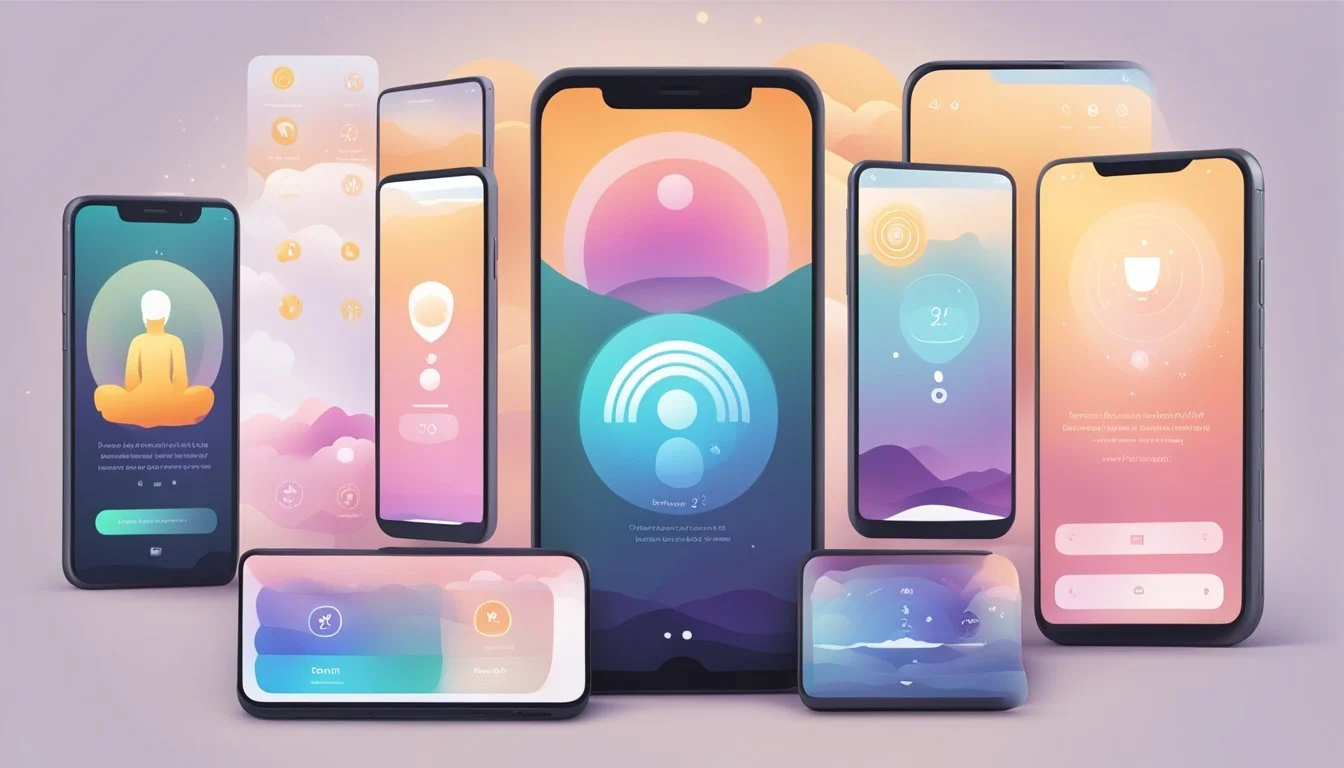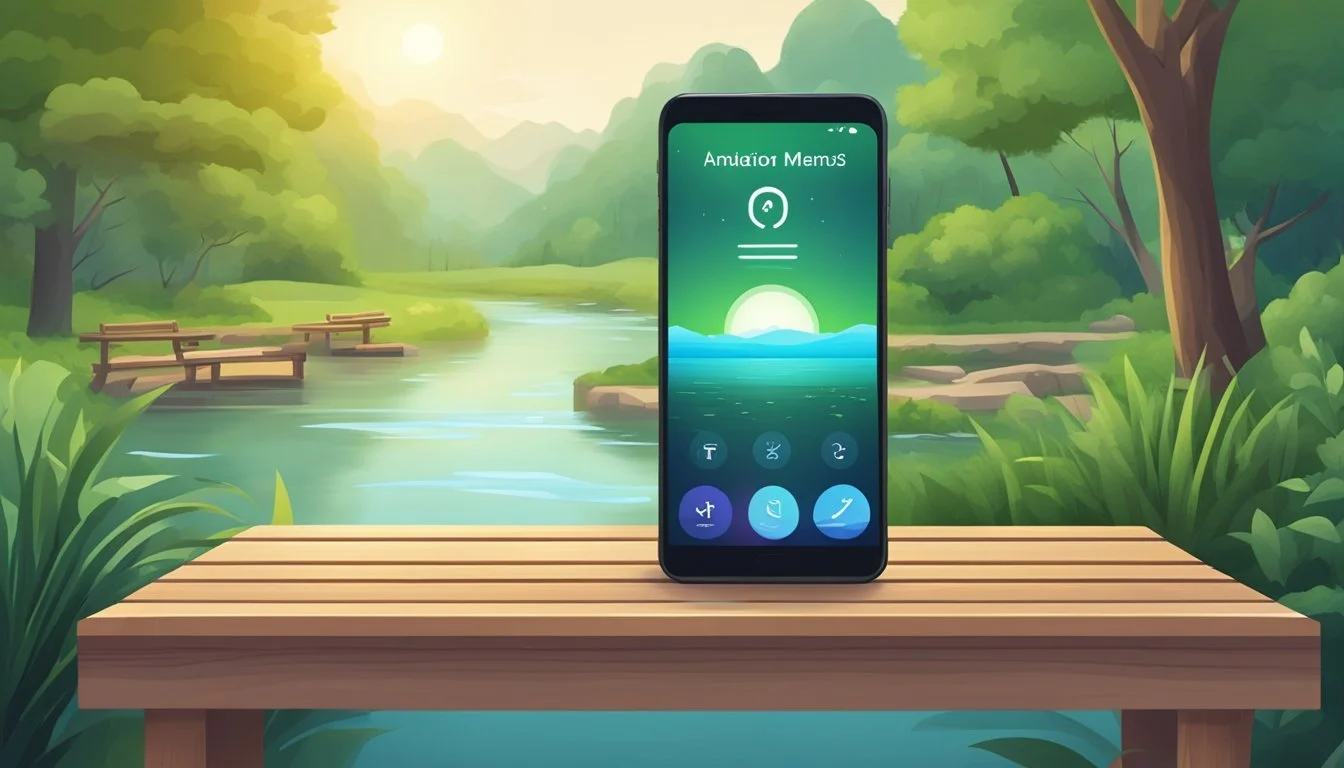5 Meditation Apps Specifically Designed for Anxiety Management
Top Picks for Stress Relief
Meditation apps have become valuable tools for managing anxiety in our fast-paced digital world. These mobile applications offer guided meditations, breathing exercises, and mindfulness techniques accessible at the tap of a screen. By providing convenient, on-demand support, meditation apps empower users to address anxiety symptoms anytime, anywhere.
Many developers have created apps specifically tailored to anxiety management, recognizing the unique needs of those struggling with this common mental health concern. These specialized applications often incorporate features like mood tracking, personalized recommendations, and anxiety-focused meditations. With a growing selection of options available, users can find apps that align with their preferences and anxiety management goals.
1) Headspace
Headspace is a popular meditation app designed to help users manage stress and anxiety. The app offers a wide range of guided meditations and mindfulness exercises specifically tailored for anxiety relief.
Headspace provides a structured approach to meditation, with courses targeting different aspects of mental health. Its anxiety-focused content aims to help users recognize anxious thoughts and learn techniques to let them go.
The app's interface is user-friendly, making it accessible for beginners and experienced meditators alike. Users can choose from various session lengths to fit meditation into their daily routines.
Headspace incorporates visualization techniques in its stress management courses. These exercises engage the mind and help users focus on calming imagery.
The app also features sleep sounds and relaxation aids to promote better rest, which can be beneficial for anxiety sufferers. Regular use of Headspace may contribute to improved emotional regulation and stress reduction.
2) Calm
Calm stands out as a leading meditation app designed to help users manage anxiety and stress. The app offers a wide range of features tailored to promote relaxation and mental well-being.
Calm's library includes guided meditations specifically aimed at reducing anxiety symptoms. Users can access short practices to anchor themselves during overwhelming moments.
The app incorporates evidence-based breathwork techniques to help soften anxiety, release tension, and sharpen focus. These can be particularly useful for managing stress in daily life.
Calm also provides Sleep Stories and soundscapes to assist those struggling with anxiety-related sleep issues. These features aim to lull users into a restful state, promoting better sleep quality.
The app's content is research-based, designed to help users build life-changing habits that support mental health. Regular use of Calm's tools may contribute to improved stress management and overall well-being.
Calm offers a subscription-based model, allowing users to access its full range of features. The app is available on both iOS and Android platforms, making it accessible to a wide user base.
3) MyLife
MyLife is a meditation app tailored for anxiety management. It offers personalized meditation and mindfulness exercises based on the user's current emotional state.
Users begin by checking in with their feelings through a brief questionnaire. The app then recommends specific meditations to address their needs.
MyLife provides a variety of guided meditations, ranging from short sessions for quick stress relief to longer, more in-depth practices. The app includes breathing exercises and yoga-inspired movements to help calm both mind and body.
A unique feature of MyLife is its mood tracking capability. Users can log their emotions before and after each session, allowing them to monitor their progress over time.
The app also offers educational content about stress, anxiety, and mindfulness techniques. This helps users develop a deeper understanding of their mental health and the tools available to manage it.
MyLife is suitable for both beginners and experienced meditators. Its user-friendly interface and customizable options make it accessible to people at various stages of their mindfulness journey.
With regular use, MyLife aims to help individuals build resilience against anxiety and develop lasting mindfulness habits. The app serves as a practical tool for incorporating meditation into daily life.
4) Simple Habit
Simple Habit is a meditation app designed for busy individuals seeking stress relief and improved wellbeing. The app offers a vast library of 5-minute guided meditations, making it convenient for users to incorporate mindfulness into their daily routines.
Simple Habit features sessions led by experienced mindfulness experts and mental health professionals. Users can choose from a variety of themes, including anxiety management, better sleep, and increased focus.
The app provides personalized recommendations based on user goals and preferences. It also offers longer sessions and sleep-focused content for those seeking more in-depth practice.
Simple Habit has garnered positive reviews from users and mental health experts alike. Its effectiveness in reducing stress and promoting relaxation has contributed to its growing popularity.
The app is available on both iOS and Android platforms. Users can access basic features for free, with premium content available through subscription options.
5) Pacifica
Pacifica is a mobile and web-based application designed to help users manage stress, anxiety, and depression. The app incorporates tools based on evidence-based practices like cognitive behavioral therapy (CBT), mindfulness meditation, and relaxation techniques.
Users can track their mood and health using Pacifica's diary feature. This allows individuals to identify patterns in their thoughts and behaviors that may contribute to negative feelings.
The app offers guided meditation exercises to promote relaxation and mindfulness. These practices can help users reduce stress and anxiety in their daily lives.
Pacifica provides cognitive behavioral therapy exercises to assist users in reframing negative thoughts and changing unhelpful behaviors. This approach is widely recognized as effective for managing anxiety and depression.
The app is available on both iOS and Android platforms. It offers a free version with limited features, as well as paid subscription options for full access to all tools and resources.
The Importance of Meditation for Anxiety
Meditation offers powerful benefits for managing anxiety. Research has shown it can reduce stress hormones and increase relaxation. Regular practice also cultivates mindfulness and emotional regulation skills.
Scientific Evidence Supporting Meditation
Multiple studies demonstrate meditation's effectiveness for anxiety. A 2014 meta-analysis in JAMA Internal Medicine found meditation programs reduced anxiety symptoms. Brain imaging research shows meditation decreases activity in the amygdala, the brain's fear center.
Meditation also increases gray matter in regions linked to emotional regulation. A Harvard study found 8 weeks of mindfulness meditation led to measurable changes in brain regions associated with memory, sense of self, and stress.
Regular meditators show lower cortisol levels and decreased inflammatory responses to stress. This suggests meditation's benefits extend beyond just psychological effects to measurable physiological changes.
Benefits of Meditation for Anxiety Management
Meditation provides several key benefits for anxiety sufferers:
Reduces physical symptoms like rapid heartbeat and muscle tension
Improves emotional regulation and stress resilience
Increases self-awareness of anxious thoughts and reactions
Cultivates a sense of calm and relaxation
Enhances focus and concentration
With consistent practice, meditation helps break the cycle of anxious rumination. It teaches practitioners to observe thoughts without judgment. This allows for greater emotional distance from anxiety triggers.
Meditation also activates the parasympathetic nervous system. This counteracts the "fight or flight" stress response, promoting relaxation. Over time, regular meditation can help rewire the brain's anxiety circuits.
Key Features of Effective Meditation Apps
Effective meditation apps offer a range of tools to support anxiety management. They combine expert guidance with personalized options to meet individual needs.
Guided Meditations by Experts
Top meditation apps feature guided sessions led by experienced professionals. These experts often include psychologists, mindfulness teachers, and meditation practitioners. They provide clear instructions and soothing voices to help users relax and focus.
Many apps offer a variety of meditation styles. These may include mindfulness, loving-kindness, body scans, and breathing exercises. Users can choose sessions tailored to specific concerns like stress, sleep, or work anxiety.
Some apps update their content regularly. This ensures users have access to fresh meditations and keeps the practice engaging.
Customizable Meditation Sessions
Flexibility is a key feature of effective meditation apps. Users can often adjust session length to fit their schedules. Options typically range from quick 3-minute exercises to longer 30-minute practices.
Many apps allow users to set reminders and track their progress. This helps build a consistent meditation habit. Some offer ambient sounds or music that can be added to any session.
Advanced apps may use AI to personalize recommendations based on user preferences and goals. This tailored approach can enhance the effectiveness of anxiety management techniques.
Integrating Meditation into Daily Life
Establishing a consistent meditation practice and overcoming obstacles are key to reaping the full benefits of anxiety-reducing apps. A structured approach and practical strategies can help make meditation a natural part of your routine.
Creating a Routine
Set a specific time each day for meditation, such as right after waking up or before bed. Start with short 5-10 minute sessions and gradually increase duration as comfort grows. Choose a quiet, comfortable space at home or work for practice.
Link meditation to existing habits like brushing teeth or having morning coffee. This helps build consistency. Use app reminders and notifications to stay on track. Many meditation apps offer streak counters and progress tracking to boost motivation.
Consider meditating with a partner or joining a virtual group for accountability. Experiment with different types of meditation to find what resonates best.
Overcoming Common Challenges
Distractions are normal - gently redirect focus to the meditation when mind wanders. For busy schedules, try micro-meditations of 1-3 minutes throughout the day. These short bursts can still provide benefits.
If falling asleep is an issue, meditate sitting up or earlier in the day. For restlessness, start with active meditations like walking or body scans. Patience is key - it takes time to develop the habit and see results.
Set realistic expectations and be kind to yourself on difficult days. Track small wins to stay motivated. If consistency is hard, use app features like calendars or challenges to stay accountable.
Tracking Progress and Measuring Success
Effective anxiety management through meditation apps involves monitoring improvements and establishing attainable objectives. These strategies allow users to gauge their progress and stay motivated on their journey to better mental health.
Using App Features to Track Improvements
Many meditation apps offer built-in tracking tools to help users monitor their progress. These features often include daily logs, mood trackers, and meditation streak counters. Users can record their anxiety levels before and after sessions, noting any changes over time. Some apps provide visual representations of data, such as graphs or charts, making it easier to identify patterns and improvements.
Journaling features allow users to document their thoughts and feelings, providing valuable insights into triggers and coping mechanisms. Many apps also offer reminders and notifications to encourage consistent practice, which is crucial for seeing long-term benefits in anxiety reduction.
Setting Realistic Goals
Establishing achievable goals is key to maintaining motivation and measuring success in anxiety management. Users should start with small, manageable targets, such as meditating for 5 minutes daily or completing one guided session per week. As they build confidence and consistency, goals can gradually increase in duration or frequency.
It's important to focus on process-oriented goals rather than outcome-based ones. For example, aiming to meditate regularly is more beneficial than expecting immediate anxiety relief. Users should celebrate small victories and be patient with their progress, understanding that managing anxiety is an ongoing process.
Periodic self-assessments can help users evaluate their overall progress and adjust goals as needed. This approach ensures that the meditation practice remains challenging yet attainable, supporting long-term anxiety management.








